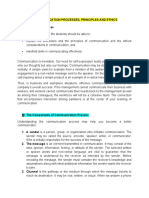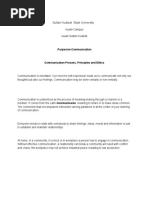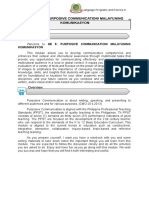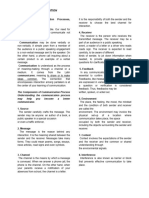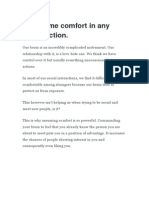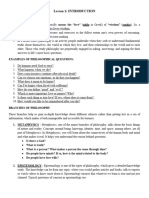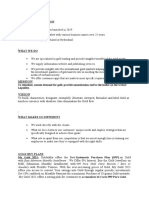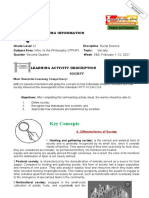Chapter 1 Lesson 2 Effective Communication Lecture Module
Uploaded by
jromarnavarreteChapter 1 Lesson 2 Effective Communication Lecture Module
Uploaded by
jromarnavarreteCHAPTER
EFFECTIVE COMMUNICATION
1
lesson 2
Introduction
People use words and languages every day to interact whether at home or
workplace. The question is have they communicated their messages effectively? In order
to be effective in communication, there are three parts to be considered: listening,
responding and understanding. Listening entails accepting of words and ideas. This is
also taking nonverbal cues such as facial expression and body language. On the other
hand, Responding is evaluating the worth of message. It requires a psychological
processing which leads to Understanding -giving meaning to the words or expressions
uttered.
Besides knowing the fundamental truths of effective communication,
communication also requires ethics not only to be practiced by individuals but also in
businesses, and professional entities. It talks about moral good present in any form of
human communication. In this lesson, Principles of Effective of Communication and
Communication Ethics will be discussed thoroughly.
Learning Outcomes
At the end of the lesson, you should be able to:
a. explain the principles of effective communication;
b. define the guidelines in ethical communication; and
c. formulate judgment on what is good, right or virtuous in communication.
Learning Contents
1. BASIC PRINCIPLES OF EFFECTIVE COMMUNICATION
Many definitions describe communication as a transfer of information, thoughts or
ideas to create shared understanding between a sender and a receiver. The information
may be written or spoken, professional or social, personal or impersonal to name a few
possibilities. Basically, the communication process involves a sender, receiver, message,
channel and feedback. However, this simplistic description significantly under-represents
what can actually be a very complex process.
Michael Osborn (2009) claims that communication must meet certain standards for
effective communication to take place.
a. Clarity: Clarity makes speeches understandable. Fuzzy language is absolutely
forbidden, as are jargons, cliché expressions, euphemisms, and double speak language.
b. Concreteness: Concreteness reduces misunderstandings. Messages must be
supported by facts such as research data, statistics or figures. To achieve concreteness
abstract words must be avoided
c. Courtesy: Courtesy builds goodwill. It involves being polite in terms of approach and
manner of addressing an individual.
d. Correctness: Glaring mistakes in grammar obscures the meaning of the sentence.
Also, the misuse of language can damage your credibility
e. Consideration: Messages must be geared towards the audience. The sender of the
message must consider the recipient’s profession, level of education, race, ethnicity,
hobbies, interests, passions, advocacies, and age when drafting or delivering a message.
f. Creativity: Creativity in communication means having the ability to craft interesting
messages in terms of sentence structure and word choice.
g. Conciseness: Simplicity and directness help you to be concise. Avoid using lengthy
expressions and words that may confuse the recipient.
h. Cultural Sensitivity: Today, with the increasing emphasis on empowering diverse
cultures, lifestyles, and races and the pursuit for gender equality, cultural sensitivity
becomes an important standard for effective communication.
i. Captivating: You must strive to make messages interesting to command more attention
and better responses.
2. COMMUNICATION ETHICS
Ethics is the discussion of the judgments we make about the appropriateness,
the right or wrong, of our actions and policies be those actions communicative, political,
social, personal, or a mixture of areas (Johnessen, 1990). There are largely unrehearsed
conversations however when an individual or organization communicates. There are
factors to be considered such as audience, context and purpose. How we communicate
depends on who we are talking, what we are discussing and where & when the talk is
taking place? Here, Ethics plays a crucial role in communication. In real world, mindful or
ethical use language must be practiced.
Here are the guidelines for ethical communication which should shape communication
practice:
a. Ethical Communicators are Respectful of Their Audiences
b. Ethical Communicators Consider the Consequences of Their Communication.
c. Ethical Communicators Respect Truth.
d. Ethical Communicators Use Information Properly.
e. Ethical Communicators Do Not Falsify Information.
f. Ethical Communicators Respect the Rights of Others to Information.
3. ETHICS OF EFFECTIVE COMMUNICATION
Ethical communication is fundamental to responsible thinking, decision making,
and the development of relationships and communities within and across contexts,
cultures, channels, and media. Moreover, ethical communication enhances human worth
and dignity by fostering truthfulness, fairness, responsibility, personal integrity, and
respect for self and others.
POINTS TO PONDER
Ethics is the discipline that examines one’s moral standards of a society.
Communication is the process of exchanging ideas, opinions, and information
between two or more interlocutors.
The members of the National Communication Association in America, endorsed
and are committed to practicing the following principles of ethical communication that are
especially relevant for students today:
They advocate truthfulness, accuracy, honesty, and reason as essential to the integrity of
communication.
They endorse freedom of expression, diversity of perspective, and tolerance of
dissent to achieve the informed and responsible decision making fundamental to a civil
society.
They strive to understand and respect other communicators before evaluating and
responding to their messages.
They promote access to communication resources and opportunities as necessary
to fulfil human potential and contribute to the well-being of families, communities, and
society.
They promote communication climates of caring and mutual understanding that
respect the unique needs and characteristics of individual communicators.
They condemn communication that degrades individuals and humanity through
distortion, intimidation, coercion, and violence, and through the expression of intolerance
and hatred.
They are committed to the courageous expression of personal convictions in
pursuit of fairness and justice.
They advocate sharing information, opinions, and feelings when facing significant
choices while also respecting privacy and confidentiality.
They accept responsibility for the short- and long-term consequences for our own
communication and expect the same of others.
Source: https://www.lanecc.edu/llc/speech/ethical-communication
POINTS TO PONDER
Practicing ethics in communication is anticipating and weighing the effects of one’s message
on an audience.
Ethical use of language is also a must when preparing for such deliberate form of
communication.
You might also like
- A Pocket Guide To Public Speaking (5th Edition)100% (12)A Pocket Guide To Public Speaking (5th Edition)340 pages
- Reading Explorer 2 3rd Ed Answer Key - Compress80% (10)Reading Explorer 2 3rd Ed Answer Key - Compress24 pages
- Think Fast, Talk Smart - Communication Techniques83% (6)Think Fast, Talk Smart - Communication Techniques2 pages
- How To Be A Human Lie Detector Vanessa VanEdwards85% (26)How To Be A Human Lie Detector Vanessa VanEdwards84 pages
- Join Judy'S Online Workshop: "Comedy Formulas That Work"100% (2)Join Judy'S Online Workshop: "Comedy Formulas That Work"9 pages
- PAG-DAYAO (Performing Artist Guild - Dayao) Constitution and By-LawsNo ratings yetPAG-DAYAO (Performing Artist Guild - Dayao) Constitution and By-Laws6 pages
- PORCUM PRE-LIM_COMMUNICATION PROCESS, PRINCIPLES AND ETHICSNo ratings yetPORCUM PRE-LIM_COMMUNICATION PROCESS, PRINCIPLES AND ETHICS32 pages
- WEEK-2-COMMUNICATION-PRINCIPLES-PROCESSES-AND-ETHICSNo ratings yetWEEK-2-COMMUNICATION-PRINCIPLES-PROCESSES-AND-ETHICS42 pages
- Lesson 4 Communication Principles and EthicsNo ratings yetLesson 4 Communication Principles and Ethics3 pages
- GE001 Module 1 Understanding 21st Century Part ANo ratings yetGE001 Module 1 Understanding 21st Century Part A6 pages
- A-Lesson-Plan-in-Purposive-CommunicationNo ratings yetA-Lesson-Plan-in-Purposive-Communication5 pages
- Sultan Kudarat State University: Purposive CommunicationNo ratings yetSultan Kudarat State University: Purposive Communication5 pages
- City College of Tagaytay: Republic of The PhilippinesNo ratings yetCity College of Tagaytay: Republic of The Philippines9 pages
- Chapter 1: Understanding 21: Century Communication Lesson I: Communication Processes, Principle and Ethics OverviewNo ratings yetChapter 1: Understanding 21: Century Communication Lesson I: Communication Processes, Principle and Ethics Overview32 pages
- Lesson 1 Definition and Importance of CommunicationNo ratings yetLesson 1 Definition and Importance of Communication2 pages
- MODULE 1 PURPOSSIVE COMMUNICATION MALAYUNING KOMUNIKASYON AutosavedNo ratings yetMODULE 1 PURPOSSIVE COMMUNICATION MALAYUNING KOMUNIKASYON Autosaved27 pages
- 8-30-2022module 1 - Lesson 1-Models of CommunicationNo ratings yet8-30-2022module 1 - Lesson 1-Models of Communication33 pages
- Purposive Communication Module Unit 1 8No ratings yetPurposive Communication Module Unit 1 869 pages
- Lesson 01: Communication: Process, Principles and Ethics: OutcomesNo ratings yetLesson 01: Communication: Process, Principles and Ethics: Outcomes9 pages
- Communication Processes, Principles and EthicsNo ratings yetCommunication Processes, Principles and Ethics16 pages
- COMMUNICATION_PRINCIPLES_PROCESSES_ELEMENTS_AND_ETHICS(2)No ratings yetCOMMUNICATION_PRINCIPLES_PROCESSES_ELEMENTS_AND_ETHICS(2)37 pages
- 11 Disciplines and Ideas in The Applied Social Sciences - Module 2No ratings yet11 Disciplines and Ideas in The Applied Social Sciences - Module 216 pages
- LESSON 1. Communication in The Twenty-First CenturyNo ratings yetLESSON 1. Communication in The Twenty-First Century26 pages
- GROUP-1-UNDERSTANDING-21st-CENTURY-COMMUNICATION-3No ratings yetGROUP-1-UNDERSTANDING-21st-CENTURY-COMMUNICATION-38 pages
- Listen, Speak, Lead: Elevate Your Success with Effective CommunicationFrom EverandListen, Speak, Lead: Elevate Your Success with Effective CommunicationNo ratings yet
- Chapter 3 Lesson 1 LOCAL AND GLOBAL COMMUNICATION IN MULTICULTURALNo ratings yetChapter 3 Lesson 1 LOCAL AND GLOBAL COMMUNICATION IN MULTICULTURAL4 pages
- Chapter 2 Lesson 1 Communication and Globalization Lecture ModuleNo ratings yetChapter 2 Lesson 1 Communication and Globalization Lecture Module6 pages
- Chapter 1 Lesson 1 Elements and Models of Communication Lecture ModuleNo ratings yetChapter 1 Lesson 1 Elements and Models of Communication Lecture Module5 pages
- Communicating Effectively For Dummies Cheat Sheet For DummiesNo ratings yetCommunicating Effectively For Dummies Cheat Sheet For Dummies4 pages
- 7 Step Conversation Cheat Sheet by Patrick King PDF100% (2)7 Step Conversation Cheat Sheet by Patrick King PDF25 pages
- Speech and Language Evaluation Diagnostic Report Fall 2020 Confidential100% (1)Speech and Language Evaluation Diagnostic Report Fall 2020 Confidential3 pages
- Watch Susan Cain's Presentation and Answer The QuestionsNo ratings yetWatch Susan Cain's Presentation and Answer The Questions1 page
- Social Action & Interaction: Presented By:Sabina ROLL NO: 18167026 Subject: Sociology Submitted To: Dr. Shahab UddinNo ratings yetSocial Action & Interaction: Presented By:Sabina ROLL NO: 18167026 Subject: Sociology Submitted To: Dr. Shahab Uddin21 pages
- Download Communicating Ethically: Character, Duties, Consequences, and Relationships William W. Neher ebook All Chapters PDF100% (6)Download Communicating Ethically: Character, Duties, Consequences, and Relationships William W. Neher ebook All Chapters PDF65 pages
- Lesson 6.-Theories of Justice: 1. - Legality, Legitimacy, LegitimationNo ratings yetLesson 6.-Theories of Justice: 1. - Legality, Legitimacy, Legitimation14 pages
- Week 1: Chapter 1: Financial Accounting TheoryNo ratings yetWeek 1: Chapter 1: Financial Accounting Theory34 pages
- Good Manners and Right Conduct: 1 SEM A Y: 2020-2021No ratings yetGood Manners and Right Conduct: 1 SEM A Y: 2020-202140 pages
- Group 4.leadership Effectiveness in Nigerian PoliticsNo ratings yetGroup 4.leadership Effectiveness in Nigerian Politics12 pages
- Join Judy'S Online Workshop: "Comedy Formulas That Work"Join Judy'S Online Workshop: "Comedy Formulas That Work"
- PAG-DAYAO (Performing Artist Guild - Dayao) Constitution and By-LawsPAG-DAYAO (Performing Artist Guild - Dayao) Constitution and By-Laws
- PORCUM PRE-LIM_COMMUNICATION PROCESS, PRINCIPLES AND ETHICSPORCUM PRE-LIM_COMMUNICATION PROCESS, PRINCIPLES AND ETHICS
- WEEK-2-COMMUNICATION-PRINCIPLES-PROCESSES-AND-ETHICSWEEK-2-COMMUNICATION-PRINCIPLES-PROCESSES-AND-ETHICS
- Sultan Kudarat State University: Purposive CommunicationSultan Kudarat State University: Purposive Communication
- City College of Tagaytay: Republic of The PhilippinesCity College of Tagaytay: Republic of The Philippines
- Chapter 1: Understanding 21: Century Communication Lesson I: Communication Processes, Principle and Ethics OverviewChapter 1: Understanding 21: Century Communication Lesson I: Communication Processes, Principle and Ethics Overview
- Lesson 1 Definition and Importance of CommunicationLesson 1 Definition and Importance of Communication
- MODULE 1 PURPOSSIVE COMMUNICATION MALAYUNING KOMUNIKASYON AutosavedMODULE 1 PURPOSSIVE COMMUNICATION MALAYUNING KOMUNIKASYON Autosaved
- 8-30-2022module 1 - Lesson 1-Models of Communication8-30-2022module 1 - Lesson 1-Models of Communication
- Lesson 01: Communication: Process, Principles and Ethics: OutcomesLesson 01: Communication: Process, Principles and Ethics: Outcomes
- COMMUNICATION_PRINCIPLES_PROCESSES_ELEMENTS_AND_ETHICS(2)COMMUNICATION_PRINCIPLES_PROCESSES_ELEMENTS_AND_ETHICS(2)
- 11 Disciplines and Ideas in The Applied Social Sciences - Module 211 Disciplines and Ideas in The Applied Social Sciences - Module 2
- LESSON 1. Communication in The Twenty-First CenturyLESSON 1. Communication in The Twenty-First Century
- GROUP-1-UNDERSTANDING-21st-CENTURY-COMMUNICATION-3GROUP-1-UNDERSTANDING-21st-CENTURY-COMMUNICATION-3
- Listen, Speak, Lead: Elevate Your Success with Effective CommunicationFrom EverandListen, Speak, Lead: Elevate Your Success with Effective Communication
- Chapter 3 Lesson 1 LOCAL AND GLOBAL COMMUNICATION IN MULTICULTURALChapter 3 Lesson 1 LOCAL AND GLOBAL COMMUNICATION IN MULTICULTURAL
- Chapter 2 Lesson 1 Communication and Globalization Lecture ModuleChapter 2 Lesson 1 Communication and Globalization Lecture Module
- Chapter 1 Lesson 1 Elements and Models of Communication Lecture ModuleChapter 1 Lesson 1 Elements and Models of Communication Lecture Module
- Communicating Effectively For Dummies Cheat Sheet For DummiesCommunicating Effectively For Dummies Cheat Sheet For Dummies
- 7 Step Conversation Cheat Sheet by Patrick King PDF7 Step Conversation Cheat Sheet by Patrick King PDF
- Speech and Language Evaluation Diagnostic Report Fall 2020 ConfidentialSpeech and Language Evaluation Diagnostic Report Fall 2020 Confidential
- Watch Susan Cain's Presentation and Answer The QuestionsWatch Susan Cain's Presentation and Answer The Questions
- Social Action & Interaction: Presented By:Sabina ROLL NO: 18167026 Subject: Sociology Submitted To: Dr. Shahab UddinSocial Action & Interaction: Presented By:Sabina ROLL NO: 18167026 Subject: Sociology Submitted To: Dr. Shahab Uddin
- Download Communicating Ethically: Character, Duties, Consequences, and Relationships William W. Neher ebook All Chapters PDFDownload Communicating Ethically: Character, Duties, Consequences, and Relationships William W. Neher ebook All Chapters PDF
- Lesson 6.-Theories of Justice: 1. - Legality, Legitimacy, LegitimationLesson 6.-Theories of Justice: 1. - Legality, Legitimacy, Legitimation
- Good Manners and Right Conduct: 1 SEM A Y: 2020-2021Good Manners and Right Conduct: 1 SEM A Y: 2020-2021
- Group 4.leadership Effectiveness in Nigerian PoliticsGroup 4.leadership Effectiveness in Nigerian Politics































